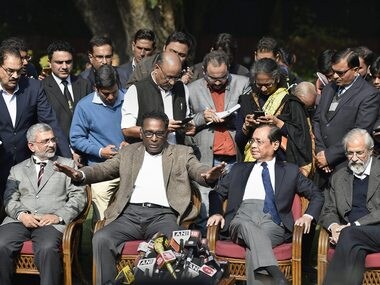Everyone was taken by surprise when four senior judges of the Supreme Court on Friday mounted a virtual revolt against the Chief Justice of India, Dipak Misra, raising questions on "selective" case allocation and certain judicial orders.
Advocate Gautam Bhatia, in a series of tweets, said on Friday that in the last 20 years, the office of the Chief Justice of India has received a lot of power without having any system of accountability to keep it in check.

Four Supreme Court judges held a press conference on Friday. PTI
Bhatia argued that two features in the Indian legal system — "the splitting up of the Supreme Court into multiple different benches, and the massive backlog of cases" — make these powers problematic. "In this context, the Chief Justice's powers to assign cases to benches and to decide when a case is to be heard become very significant," he said in one tweet.
"The Chief Justice's administrative power effectively transform itself into a power to significantly influence the outcomes of cases (sic)," Bhatia further said.
The power of the CJI to decide the composition of the benches is especially significant. This gives whoever holds the position of CJI a lot of power to influence the outcome of a case, according to this blog post by Bhatia.
The CJI also has the power to break the massive queue of pending cases and select a case which needs to be heard sooner. Lawyers can appeal for a case to be heard sooner through an oral "mentioning" before the CJI. "The CJI has absolute discretion to allow or deny a mentioning request for an early hearing, just as he has an absolute discretion in deciding when larger benches are to assemble (along with their composition)," Bhatia said.
Bhatia also said that the two-and-a-half-year delay in the listing of the Aadhaar case was an example of the consequences of such power.
"The Office of the Chief Justice is effectively answerable to none," he said in another tweet.
"The combination of absolute power, complete opacity, and no accountability in the Office of the Chief Justice basically means that for the institution to survive, every CJI must be utterly incorruptible, absolutely impartial, and beyond reproach," he further said.
Bhatia also said that another result of this kind of absolute power was witnessed recently when the Chief Justice had constituted a bench for a case in which the CJI was "potentially implicated".
That case involved petitions asking for an impartial SIT probe into allegations that a retired judge of the Orissa High Court, along with "others", had been taking bribes to "fix" a matter being heard in the Supreme Court, according to another blog post by Bhatia.
During the course of a hearing, Justice Chelameswar — noting that the allegations were serious — referred the matter to be heard by the five senior-most judges of the apex court on 13 November, 2017.
When another petition related to this case came up for hearing on 10 November, Justices Sikri and Bhushan took note of Justice Chelameswar's decision and referred the matter to Chief Justice of India Dipak Misra.
CJI Misra "constituted a bench to hear it that same afternoon".
"In a short order, that bench effectively annulled the order of reference passed by Justice Chelameswar the day before," Bhatia wrote in the blog post.
The reasoning given by the bench was that on the administrative side of the apex court, the CJI is the "master of the roster" and that "he alone has the prerogative to constitute benches of the Court and allocate cases to the benches so constituted".
Moreover, the case which the accused was claiming to "fix" was one which was being heard by a bench presided by the CJI himself.
Thus, "there was a clear and direct clash between two principles: the Chief Justice being the 'master of the roster' on the administrative side, and 'no person shall be a judge in his own cause'."
The unprecedented move by the four judges, including Justice J Chelameswar, the second senior judge after Chief Justice Dipak Misra, brought to fore the simmering differences between Chief Justice Misra and some senior judges in the apex court in recent months. The apex court currently has 25 judges.
Justice Chelameswar himself described the joint news press conference as an "extraordinary event" in the annals of the Indian judiciary. "Sometimes administration of the Supreme Court is not in order and many things which are less than desirable have happened in the last few months," he added.
The judge accused the CJI of not taking any "remedial measures" on some of the issues which affected the functioning of the apex court that they had raised. Misra became the CJI on 28 August, 2017 and he is due to retire from on 2 October this year.
Unless this institution is preserved, "democracy will not survive" in this country, Justice Chelameswar said at the unscheduled press conference, in the first of its kind event in Independent India, leaving uncertain how this open dissension in the hallowed institution would be resolved.
Click here to follow LIVE updates on the Supreme Court judges' rebellion.
With inputs from PTI
Published Date: Jan 13, 2018 10:19 AM | Updated Date: Jan 13, 2018 13:43 PM